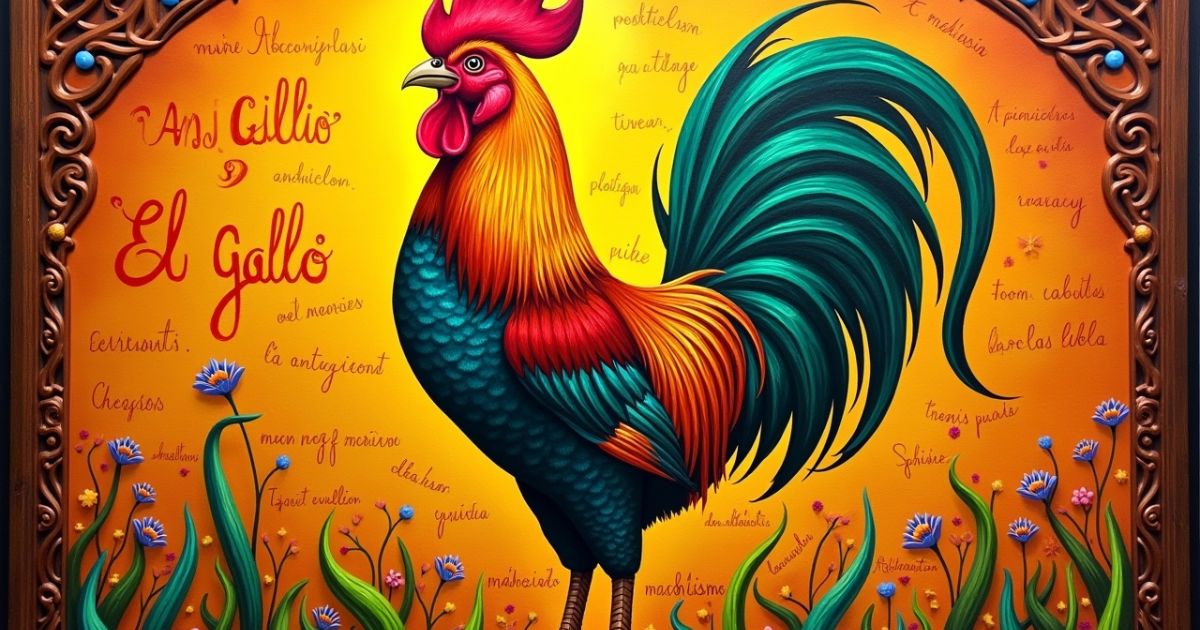The term el gallo (Spanish for “the rooster”) represents far more than a simple barnyard animal. This powerful symbol carries deep cultural resonance across Spanish-speaking nations and beyond, embodying concepts of courage, pride, and renewal that have shaped traditions for centuries.
While the literal translation remains straightforward, el gallo encompasses a rich tapestry of meanings spanning folklore, cuisine, spirituality, and popular culture. The rooster’s influence extends from ancient symbolic traditions to contemporary expressions, making it one of the most enduring cultural icons in Hispanic heritage.
This comprehensive exploration examines the multifaceted significance of el gallo, revealing how this symbol has evolved from rural practicality to profound cultural meaning. Whether encountered in traditional songs, regional dishes, or everyday expressions, the rooster continues to represent fundamental human values and aspirations.
Literal Meaning of “El Gallo”
At its most fundamental level, “El Gallo” translates directly to “The Rooster” in English. However, this simple translation barely scratches the surface of its cultural depth and significance.
What Does “El Gallo” Mean?
In Spanish, “gallo” specifically refers to the male chicken, distinguished by its distinctive crowing and proud demeanor. The rooster has served as a natural timekeeper for rural communities throughout history, marking the transition from night to day with its characteristic call at dawn.
Rural societies have depended on roosters for centuries, viewing them as symbols of vigilance, discipline, and reliability. The bird’s role extends beyond mere timekeeping to encompass broader concepts of leadership and protective guardianship within agricultural communities.
Phonetic Breakdown:
El Gallo: [el gah-yo]
The pronunciation varies slightly across different Spanish-speaking regions, though the fundamental phonetic structure remains consistent throughout the Hispanic world.
The term’s linguistic simplicity contrasts sharply with its complex cultural applications, where “el gallo” transcends its literal meaning to represent various symbolic and metaphorical concepts.
The Symbolism & Cultural Importance of El Gallo
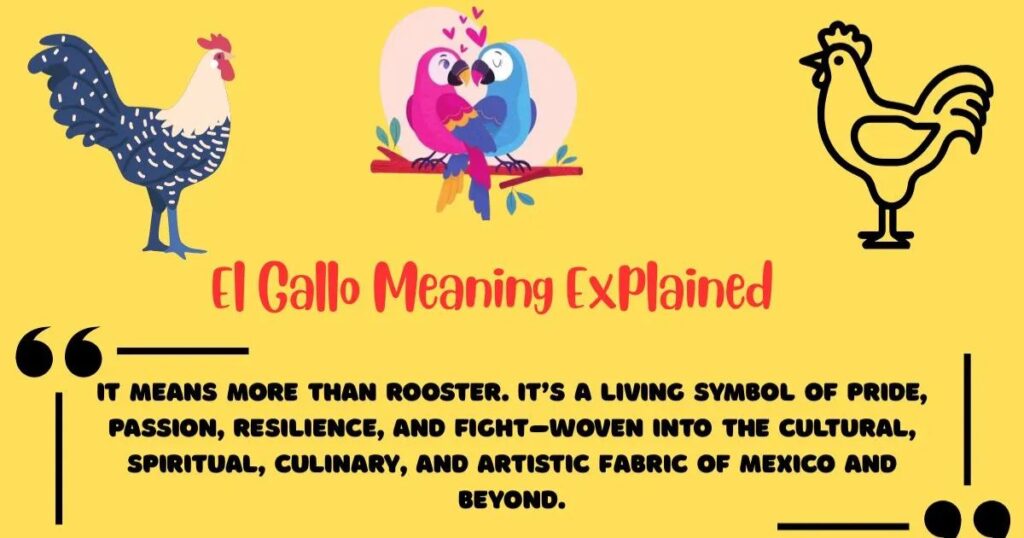
Roosters occupy a position of extraordinary significance within Spanish-speaking cultures, representing far more than agricultural utility. El Gallo embodies fundamental human virtues including strength, honor, and determination.
The Rooster is a Symbol of Strength and Courage
Traditional Spanish culture has long associated the rooster with masculine virtues, power, and dignity. The bird’s dawn crowing serves as a natural call to action, symbolizing readiness to face challenges and embrace new opportunities.
The rooster’s natural fighting instincts contribute to its symbolic representation of resilience and tenacity. This combative spirit translates into cultural metaphors for human courage and the willingness to defend one’s principles and territory.
“El Gallo” in Folklore and Proverbs
Spanish folklore contains numerous proverbs featuring el gallo, each carrying traditional wisdom and cultural insights. These sayings reflect the rooster’s integral role in daily life and moral instruction.
Traditional expressions include references to the rooster’s reliability as a timekeeper and its role as a community guardian. These proverbs emphasize themes of punctuality, vigilance, and community responsibility.
The folklore surrounding roosters often portrays them as wise, protective figures who serve their communities through dedication and unwavering commitment to their duties.
The Birth of New Beginnings
The rooster’s dawn call represents hope, renewal, and fresh opportunities. Mexican culture particularly embraces this symbolism, viewing each new day as a chance for transformation and growth.
This association with new beginnings extends beyond daily renewal to encompass broader life transitions, seasonal changes, and spiritual rebirth. The rooster’s crow signals that previous challenges can be overcome and new possibilities await.
El Gallo in Popular Culture
El Gallo maintains a prominent presence throughout Latin American and Mexican entertainment, literature, and media, serving as both literal subject and powerful metaphor.
Music and Songs: The Rooster in Latin Music
The classic ranchera song “El Gallo de Oro” represents one of the most celebrated musical tributes to rooster symbolism. Performed by legendary Mexican vocalist Vicente Fernández, the song portrays a proud, defiant character embodying the rooster’s fearless and hardy nature.
The musical tradition surrounding roosters celebrates individuals who confront challenges with confidence, pride, and unwavering determination. These songs often portray the rooster as a symbol of personal strength and community leadership.
Notable Lyrics from “El Gallo de Oro”:
The song’s powerful lyrics emphasize themes of fearlessness and self-confidence, portraying the protagonist as someone who faces adversity without hesitation or compromise.
These musical expressions reinforce the rooster’s cultural significance as a symbol of personal courage and social standing within traditional Mexican society.
“El Gallo” in Literature and Film
Mexican literature frequently employs rooster symbolism to represent community spirit, natural harmony, and fighting determination. The bird appears in various literary contexts as a symbol of rural authenticity and traditional values.
Cinema has embraced the rooster as a metaphor for heroism, courage, and struggle against overwhelming odds. Mexican films often feature rooster imagery to convey themes of resistance and survival in challenging circumstances.
The character of El Gallo in Lucha Libre represents this cinematic tradition, embodying the rooster’s symbolic attributes through athletic performance and dramatic storytelling.
“El Gallo” in Mexican Cuisine
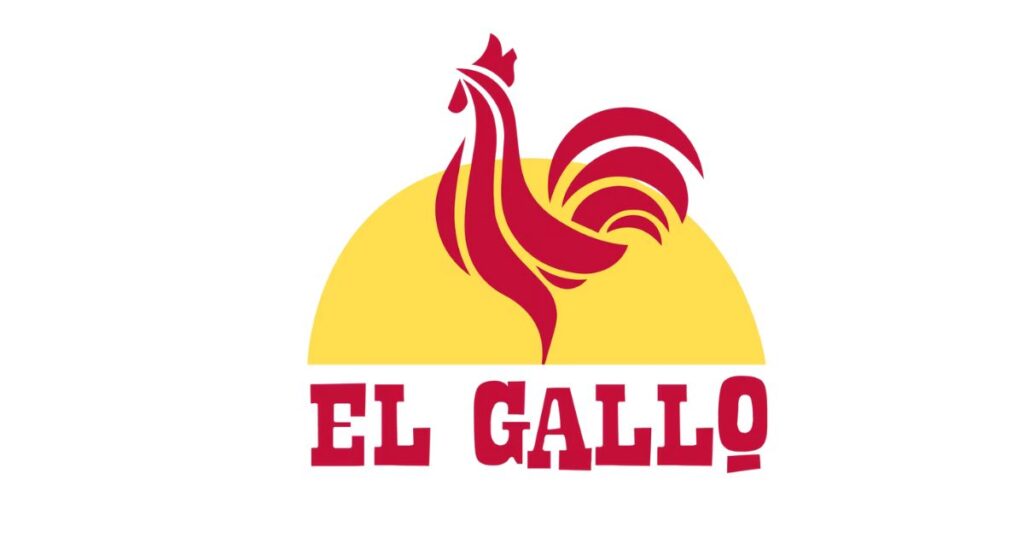
The rooster’s significance extends far beyond symbolism into the practical realm of traditional Mexican gastronomy, where rooster meat represents both culinary excellence and cultural continuity.
Rooster Dishes in Mexico
Gallo en Mole stands as one of Mexico’s most celebrated rooster preparations, combining the bird’s robust flavor with the complex, rich sauce that defines traditional Mexican cooking. This dish typically appears during holidays and special celebrations, embodying the bold, authentic flavors that characterize regional cuisine.
Gallo en Mole Recipe (Streamlined):
The preparation involves slow-cooking rooster meat in a carefully crafted mole sauce featuring roasted chilies, spices, and chocolate. This cooking method transforms the rooster’s naturally tough meat into a tender, flavorful centerpiece for important gatherings.
The dish represents the intersection of practical cooking and cultural celebration, where the rooster’s symbolic significance enhances the meal’s ceremonial and communal importance.
Festivals and Rooster Feasts
Rural Mexican communities frequently feature rooster dishes during family reunions and traditional celebrations. The preparation and sharing of rooster meals represents cultural continuity, prosperity, and community bonds.
These culinary traditions honor the rooster’s symbolic associations with fertility, strength, and abundance while providing practical nourishment for extended family gatherings and community events.
“El Gallo” en Catch Mexicano (Lucha Libre)
Mexican wrestling culture has embraced rooster symbolism as a powerful representation of fighting spirit and competitive determination.
Mascot and Symbol of Fighters
Lucha Libre wrestlers frequently adopt rooster personas due to the bird’s natural association with tenacity, combativeness, and fearless competition. The rooster represents fighters who engage opponents regardless of size disadvantages or challenging circumstances.
This wrestling tradition celebrates the rooster’s reputation for aggressive defense and territorial protection, qualities that translate effectively to athletic competition and entertainment.
Iconography in Lucha Libre
Wrestlers such as El Gallo and El Gallo Negro incorporate rooster symbolism through their masks, costumes, and performance personas. These characters embody the bird’s natural resilience and dominant presence within the wrestling environment.
The visual representation of rooster characteristics through wrestling personas reinforces the cultural connection between animal symbolism and human athletic achievement.
El Gallo as a Metaphor
Beyond literal and symbolic applications, “El Gallo” functions as a powerful metaphor in everyday language and cultural expressions.
The Rooster as a Fighter
The phrase “un gallo” describes individuals who demonstrate strong determination, fearless attitude, and willingness to confront challenges. Like the rooster, these people stand ready to defend their beliefs and fight for their convictions.
Common Phrases and Expressions with “El Gallo”
“A gallear” refers to displaying confidence and pride, mimicking the rooster’s characteristic strutting behavior and self-assured demeanor.
“Gallo de pelea” describes a fighter or someone who readily accepts challenges without backing down from confrontation.
These expressions demonstrate how rooster characteristics have become integrated into everyday language to describe human behavior and personality traits.
El Gallo in Religion & Spirituality
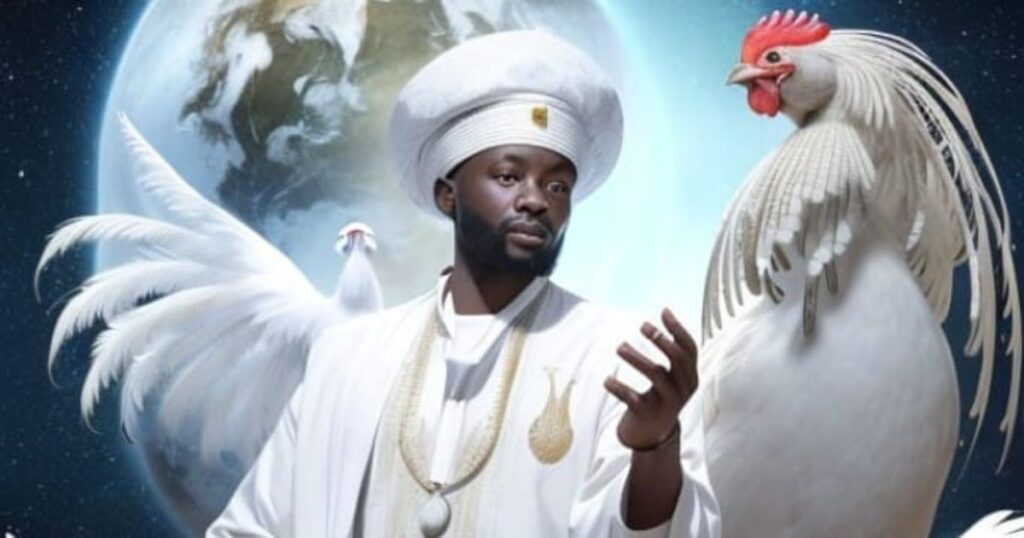
The rooster carries significant meaning within Christian tradition and various spiritual practices throughout Spanish-speaking cultures.
The Rooster in Catholic Iconography
Christian tradition associates the rooster with repentance and spiritual awakening, primarily through the biblical account of Peter’s denial of Christ. The rooster’s crow in this context represents divine warning and moral consciousness.
El Gallo: Spirit Meaning
Many spiritual traditions view El Gallo as a protective guardian and divine messenger. The rooster symbolizes spiritual vigilance and moral clarity, serving as a reminder to maintain awareness of spiritual responsibilities.
The Significance of “El Gallo” in Festivals and Traditions
Traditional celebrations honoring El Gallo provide insight into the rooster’s fundamental importance within Mexican cultural identity.
Rituals in Admiration of the Rooster
Some regions observe “Día del Gallo” (Rooster Day), featuring community celebrations with music, dancing, and feasting in recognition of the bird’s essential role in daily life and cultural tradition.
Rooster Symbolism in Cultural Celebrations
Cultural festivals frequently incorporate rooster imagery in decorations, rituals, and processions. These symbols represent power, renewal, and ancestral connections that maintain cultural continuity across generations.
International Views on “El Gallo”
While El Gallo originates from Latin American cultural heritage, rooster symbolism extends across multiple cultures and international boundaries.
Rooster Symbolism Worldwide
The rooster maintains similar symbolic significance in French, Italian, and Chinese cultures, representing courage, strength, and fertility with culturally specific variations. Each tradition expresses these universal themes through distinct cultural lenses.
France employs the rooster as its national symbol, representing liberty and independence. China associates the rooster with valor and confidence, particularly within zodiac traditions emphasizing resourcefulness and determination.
The Rooster as Political & National Symbol
National iconography frequently features roosters as symbols of vigilance, bravery, and defiant independence. The French Gallic Rooster represents national awakening and revolutionary spirit, while Portugal’s Barcelos Rooster symbolizes justice, faith, and good fortune.
These political applications demonstrate the rooster’s capacity to represent collective identity and shared values across diverse cultural and national contexts.
“El Gallo” in Gastronomy
The rooster’s culinary significance extends globally, inspiring traditional dishes that celebrate both flavor and cultural heritage.
Mexican “Gallo Pinto” represents a hearty, spicy stew featuring rooster meat, chilies, and regional herbs. Spanish Arroz con Gallo combines rooster with saffron and seasonal vegetables, while French Coq au Vin showcases the bird braised in wine with mushrooms and bacon.
Why Rooster Meat?
Culinary traditions favor rooster meat for its symbolic significance and practical advantages. Older roosters require slow cooking methods that transform tough meat into tender, flavorful dishes while honoring the bird’s cultural status.
Cockfighting: Controversy & Cultural Legacy
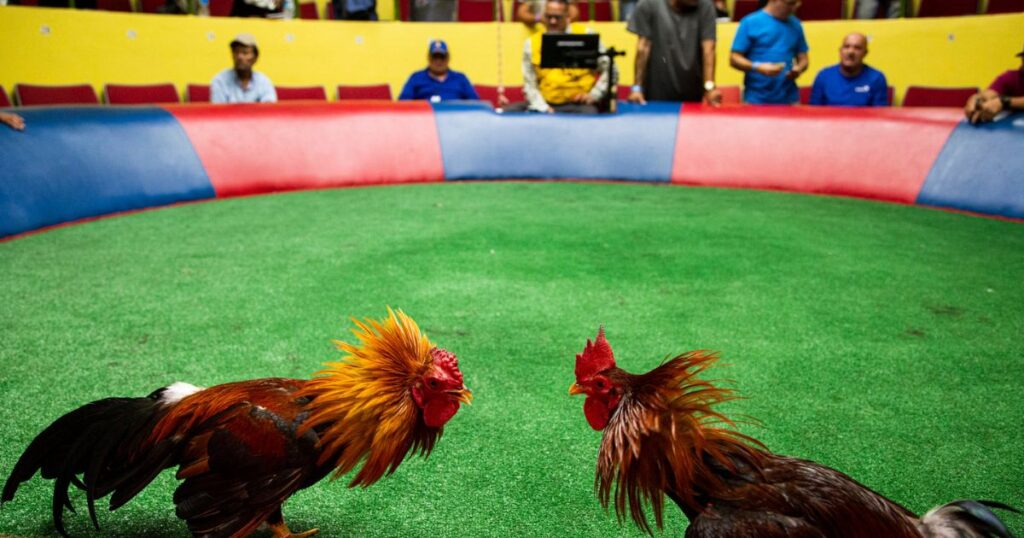
Cockfighting represents one of humanity’s oldest competitive traditions, dating back over 6,000 years to Southeast Asia before spreading globally through Spanish colonization.
Historically, these contests represented machismo, honor, and social hierarchy, particularly within Latin American and Philippine cultures. The rooster’s combative nature made it a symbol of courage and masculine vitility, with successful birds and owners gaining social status.
Modern perspectives increasingly criticize cockfighting for animal cruelty concerns, leading to prohibition in most Western nations. However, the practice continues in certain regions where it remains culturally significant, and its influence persists in language through expressions like “pelea de gallos” describing fierce rivalries or animated discussions.
FAQ’s On El Gallo
What is the meaning of “el gallo” in Spanish?
“El gallo” literally translates to “the rooster” but carries deeper cultural significance representing courage, pride, and new beginnings across various cultural contexts.
Why is the rooster a national symbol of France?
The Gallic Rooster became France’s symbol through a Latin wordplay where “Gallus” means both “rooster” and “Gaul.” It represents defiance, vigilance, and French revolutionary spirit.
What does the rooster denote in Christianity?
Christian tradition associates the rooster with repentance and redemption through Peter’s denial of Jesus, making it a symbol of spiritual awakening and moral consciousness.
Is any form of cockfighting still legal?
While banned in most Western nations, cockfighting remains legal in certain regions including parts of the Philippines, Puerto Rico, and various Latin American and Southeast Asian locations.
What’s the story of Portugal’s Barcelos Rooster?
The Galo de Barcelos legend tells of a pilgrim saved from execution when a roasted rooster miraculously crowed to prove his innocence. Today it represents justice and good fortune.
What does el gallo mean in slang?
Regional slang varies: in Mexico, “hacer un gallo” means making a mistake; in Colombia, “¡Qué gallo!” expresses frustration; in Spain, “estar gallo” means being angry.
Final Thoughts on El Gallo Meaning
The significance of “El Gallo” encompasses an extraordinarily rich and diverse cultural heritage deeply connected to the history, traditions, and values of Spanish-speaking communities worldwide.
From its humble origins as a practical farm animal to its transformation into a symbol of courage, perseverance, and renewal, “El Gallo” occupies a unique position within folklore, artistic expression, culinary tradition, and spiritual practice.
Whether encountered through traditional music, regional cuisine, or local festivals, the rooster’s symbolism provides profound insight into the heart of Mexican and Latin American culture. It represents the determination to face challenges, hope for new opportunities, and resilient character of communities that proudly embrace its meanings.
The next time a rooster’s crow breaks the morning silence, remember that it carries more than mere sound. It carries the voice of history, culture, and the enduring human spirit.

Hello, I’m Daisy Sadie, a writer at Azaadpuns. I explore the dynamic world of puns and wordplay, delivering captivating linguistic twists that will make you laugh and groan. Join me on Azaadpuns.com for the latest in clever wordplay that makes language fun again.

